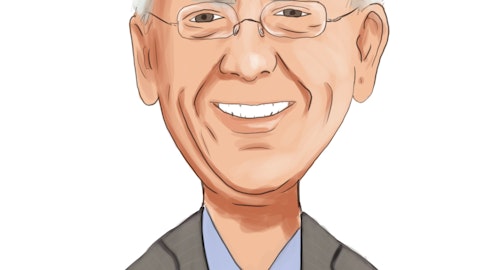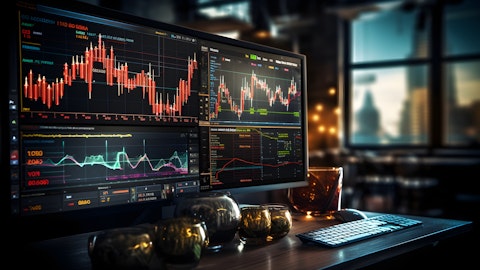We recently compiled a list of the 12 Best ADR Stocks to Buy According to Hedge Funds. In this article, we are going to take a look at where Alibaba Group Holding Limited (NYSE:BABA) stands against the other best ADR stocks.
American Depositary Receipts (ADR) are US-listed securities that represent shares in foreign companies, allowing American investors to gain exposure to international equities without dealing with foreign exchanges or currencies. Unlike regular shares of domestic companies, ADRs are issued by US banks and trade on American exchanges, typically in US dollars. While they provide easier access to foreign markets, ADRs can carry additional risks such as currency fluctuations, geopolitical factors, and differences in accounting standards or regulatory environments. Investors should also note that ADRs come in two forms: sponsored and unsponsored. Sponsored ADRs are issued in partnership with the foreign company and typically offer more reliable financial reporting and investor communication. Unsponsored ADRs, on the other hand, are created without the company’s direct involvement and may have limited information available, making due diligence more challenging.
READ ALSO: 10 Worst ADR Stocks To Buy According to Short Sellers
ADRs were not particularly popular in the last 15 years, as the US stock market has been the best-performing developed market since the 2008 financial crisis, significantly and consistently outperforming all major European markets as well as the Chinese stock market. The US stock market has massively benefited from the US’s technological leadership and the emergence of tech giants with multi-trillion-dollar capitalizations, a more favorable business environment with lower tax rates, more aggressive financial stimulus, and, more importantly, significantly higher productivity growth vs. other regions. As a result, the US stock markets not only delivered higher earnings growth but also experienced the largest increase in valuations compared to Europe and China. The latter is partially attributed to foreign capital flowing into the US market as investors recognized the superior growth opportunities of US companies.
The recent political developments initiated by the Trump 2.0 regime have set the stage for a potential reversal of the aforementioned trends, which may drive relative outperformance of foreign markets and make ADRs attractive again. First, the Trump 2.0 tariff turmoil and massive cuts in federal spending are likely to cause an economic slowdown and thus cut the earnings growth potential of domestic companies. Second, the threat of tariffs imposed on the USA’s allies is already causing retaliatory measures, including the potential substitution of American products for European or Canadian alternatives (again, this endangers the earnings growth potential of US domestic companies while boosting the potential of European and Canadian companies). Third, Europe has recognized that the US has become a less reliable partner, as evidenced by the major shift in policies of the new administration, and is already taking steps to ensure its independence and minimize dependence on the US. This is illustrated by the recent decision of Germany to create a €500 billion infrastructure fund to boost its defense capabilities (funds which are planned to be spent primarily on European contractors). Last but not least, the increasing tensions between the Western allies could potentially drive a return of European capital to the European continent, which may cause a relative valuation repricing in favor of the European stock market.
With that being said, the key takeaway for readers is that the current developments in the US and Europe suggest a potential break of the trend in which the US strongly outperformed Europe and China for the last 15 years. In this context, gaining more international exposure through ADRs could be a great way to not only hedge domestic risk but also gain exposure to new emerging tailwinds such as the accelerating European spending on defense. Both the European and Chinese stock markets have outperformed the US since election day, meaning that there is already strong confirmation for the developments discussed above.

An e-commerce platform displaying a wide range of products to customers online.
Our Methodology
For this article, we used a Finviz screener to filter all the available ADR stocks. Then we compare the list with our Q4 2024 proprietary database of hedge funds’ ownership and include in the article the top 12 stocks with the largest number of hedge funds that own the stock.
Why are we interested in the stocks that hedge funds pile into? The reason is simple: our research has shown that we can outperform the market by imitating the top stock picks of the best hedge funds. Our quarterly newsletter’s strategy selects 14 small-cap and large-cap stocks every quarter and has returned 373.4% since May 2014, beating its benchmark by 218 percentage points (see more details here).
Alibaba Group Holding Limited (NYSE:BABA)
Number of Hedge Fund Holders: 107
Alibaba Group Holding Limited (NYSE:BABA) is a China-based multinational technology company operating across e-commerce, cloud computing, digital media, and logistics. Its core businesses include online retail platforms like Taobao and Tmall, which connect consumers and merchants across China, and Alibaba Cloud, one of Asia’s largest cloud service providers. The company also operates Cainiao for logistics and AliExpress for cross-border e-commerce targeting international markets. It supports its ecosystem with digital payment services through Ant Group (in which it holds a stake) and data-driven marketing. BABA ranked first on our recent list of 7 Cheap Global Stocks to Buy Right Now.
Alibaba Group Holding Limited (NYSE:BABA) delivered solid results in 2024, showcasing renewed momentum across its core operations following a year of strategic transformation. Its domestic e-commerce platforms, Taobao and Tmall, posted a 9% YoY increase in customer management revenue, fueled by gains in both user acquisition and order volume. The cloud division also saw a notable uptick, with revenue growth reaching 13% and AI-driven product lines sustaining triple-digit annual growth for the sixth consecutive quarter. Backed by a robust financial position – including a net cash reserve of RMB 378.5 billion (USD 51.9 billion) – BABA remains well-positioned to support its future plans. It is among the best ADR stocks on our list.
Alibaba Group Holding Limited (NYSE:BABA) has sharpened its strategic priorities around three key areas: domestic and global e-commerce, AI combined with cloud services, and internet platform businesses. To support this vision, the company is set to ramp up investments in AI infrastructure over the next three years, with spending anticipated to surpass the total of the past decade. It has also continued its shift away from offline retail, finalizing deals to exit Sun Art and Intime for up to $1.6 billion and $1 billion, respectively. International e-commerce sustained strong momentum, with management expecting the segment to achieve its first profitable quarter in the upcoming fiscal year. Efficiency gains were also evident in other areas, such as Amap, which turned profitable during the quarter.
Overall BABA ranks 2nd on our list of the 12 best ADR stocks to buy according to hedge funds. While we acknowledge the potential of BABA as an investment, our conviction lies in the belief that AI stocks hold greater promise for delivering higher returns and doing so within a shorter time frame. If you are looking for an AI stock that is more promising than BABA but that trades at less than 5 times its earnings, check out our report about the cheapest AI stock.
READ NEXT: 20 Best AI Stocks To Buy Now and 30 Best Stocks To Buy Now According to Billionaires
Disclosure: None. This article is originally published at Insider Monkey.





